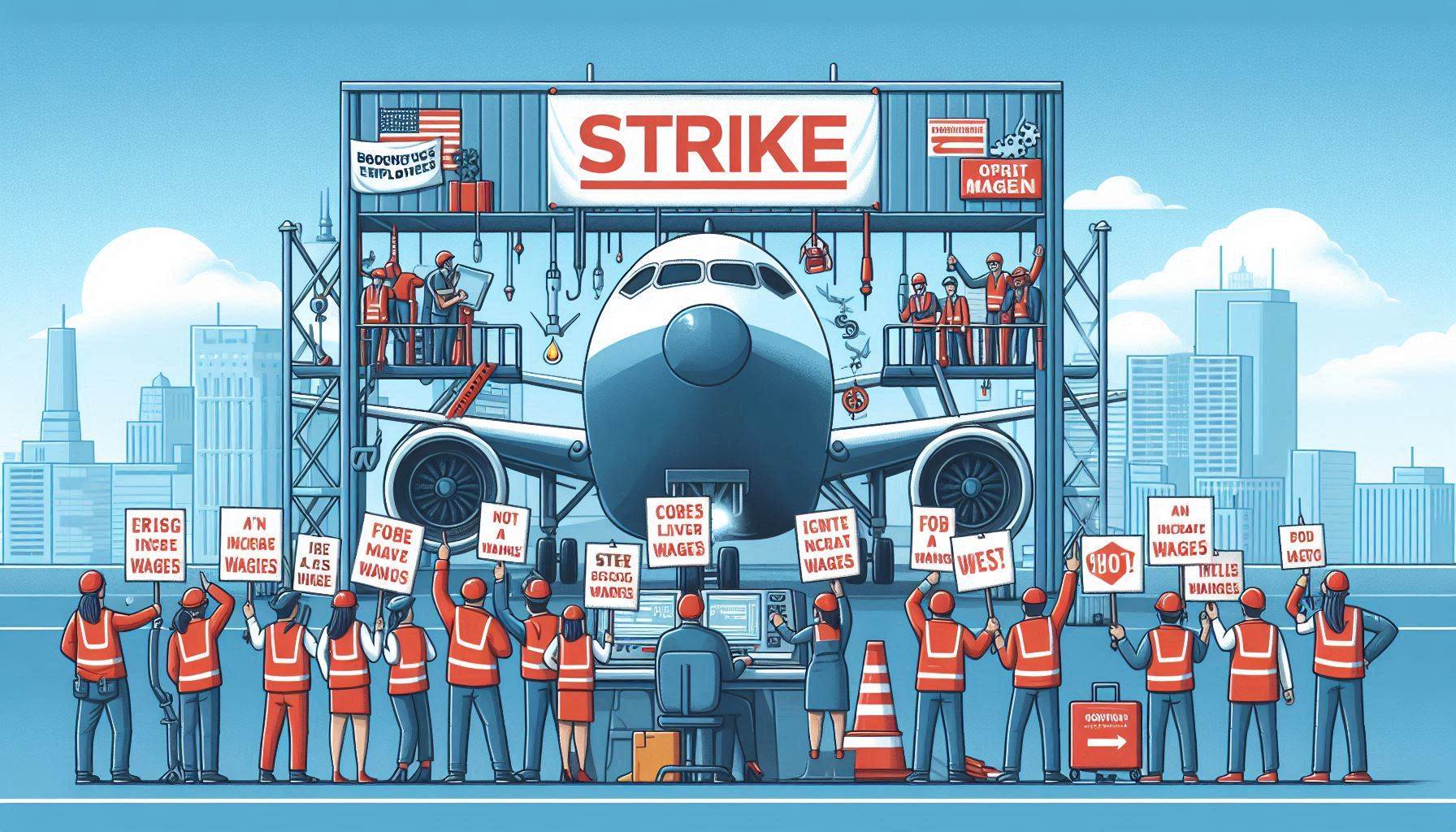Boeing Workers Continue Strike Following Contract Rejection
Boeing factory workers voted decisively against a proposed contract on Wednesday, rejecting the offer by 64%. This decision prolongs a strike that began over five weeks ago and presents a significant challenge for new CEO Kelly Ortberg, who aimed to improve relations with employees.
The contract included a 35% wage increase over four years but failed to meet the union's demands, which included a 40% pay rise and the reinstatement of a defined-benefit pension. This rejection comes after 95% of workers previously voted against an initial contract, highlighting ongoing frustrations stemming from past negotiations that workers felt were unfair.
Union leaders are eager to resume negotiations, with the last significant talks occurring in 2014. The workers have expressed anger over stagnant wages that have not kept pace with inflation while Boeing spent billions on stock buybacks and executive bonuses.
Jon Holden, the union's chief negotiator, stressed the need for renewed discussions, stating, "Boeing needs to come to the table as well." The strike, which halted production of major aircraft models like the 737 MAX and 777, threatens Boeing’s position as a leading U.S. exporter, particularly as it faces a challenging political environment with the upcoming presidential election on November 5.
If the strike continues, suppliers like Spirit AeroSystems could face layoffs. Analysts warn that the prolonged labor dispute may worsen Boeing's already precarious financial situation, as the company seeks to raise $15 billion to stabilize its credit rating.
Richard Aboulafia of AeroDynamic Advisory described this moment as critical for Ortberg, stating, "They've got to get this done, and they're in a position of weakness."



 Fed Governor Lisa Cook Warns Inflation Risks Remain as Rates Stay Steady
Fed Governor Lisa Cook Warns Inflation Risks Remain as Rates Stay Steady  Trump Lifts 25% Tariff on Indian Goods in Strategic U.S.–India Trade and Energy Deal
Trump Lifts 25% Tariff on Indian Goods in Strategic U.S.–India Trade and Energy Deal  Oil Prices Slide on US-Iran Talks, Dollar Strength and Profit-Taking Pressure
Oil Prices Slide on US-Iran Talks, Dollar Strength and Profit-Taking Pressure  Bank of Japan Signals Readiness for Near-Term Rate Hike as Inflation Nears Target
Bank of Japan Signals Readiness for Near-Term Rate Hike as Inflation Nears Target  China Extends Gold Buying Streak as Reserves Surge Despite Volatile Prices
China Extends Gold Buying Streak as Reserves Surge Despite Volatile Prices  Trump Signs Executive Order Threatening 25% Tariffs on Countries Trading With Iran
Trump Signs Executive Order Threatening 25% Tariffs on Countries Trading With Iran  Gold and Silver Prices Rebound After Volatile Week Triggered by Fed Nomination
Gold and Silver Prices Rebound After Volatile Week Triggered by Fed Nomination  Trump’s Inflation Claims Clash With Voters’ Cost-of-Living Reality
Trump’s Inflation Claims Clash With Voters’ Cost-of-Living Reality  Japan Economy Poised for Q4 2025 Growth as Investment and Consumption Hold Firm
Japan Economy Poised for Q4 2025 Growth as Investment and Consumption Hold Firm  Thailand Inflation Remains Negative for 10th Straight Month in January
Thailand Inflation Remains Negative for 10th Straight Month in January  Russian Stocks End Mixed as MOEX Index Closes Flat Amid Commodity Strength
Russian Stocks End Mixed as MOEX Index Closes Flat Amid Commodity Strength  Japanese Pharmaceutical Stocks Slide as TrumpRx.gov Launch Sparks Market Concerns
Japanese Pharmaceutical Stocks Slide as TrumpRx.gov Launch Sparks Market Concerns  Trump Endorses Japan’s Sanae Takaichi Ahead of Crucial Election Amid Market and China Tensions
Trump Endorses Japan’s Sanae Takaichi Ahead of Crucial Election Amid Market and China Tensions  Global Markets Slide as AI, Crypto, and Precious Metals Face Heightened Volatility
Global Markets Slide as AI, Crypto, and Precious Metals Face Heightened Volatility  Asian Stocks Slip as Tech Rout Deepens, Japan Steadies Ahead of Election
Asian Stocks Slip as Tech Rout Deepens, Japan Steadies Ahead of Election  South Korea’s Weak Won Struggles as Retail Investors Pour Money Into U.S. Stocks
South Korea’s Weak Won Struggles as Retail Investors Pour Money Into U.S. Stocks  U.S.-India Trade Framework Signals Major Shift in Tariffs, Energy, and Supply Chains
U.S.-India Trade Framework Signals Major Shift in Tariffs, Energy, and Supply Chains 































